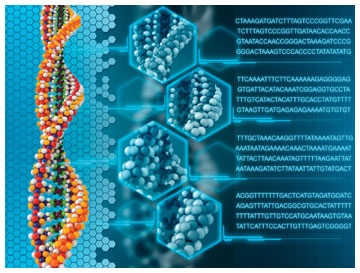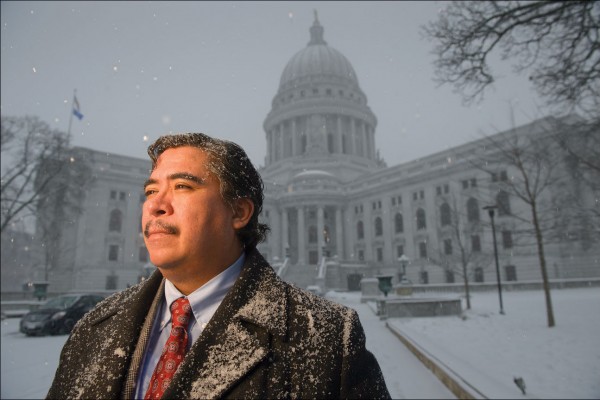The DNA debate: Justice system divided over expanding collection of genetic evidence
By: Dan Shaw, [email protected]//March 18, 2013//
The DNA debate: Justice system divided over expanding collection of genetic evidence
By: Dan Shaw, [email protected]//March 18, 2013//
 DNA evidence helped put Chris Ochoa behind bars for a murder he did not commit.
DNA evidence helped put Chris Ochoa behind bars for a murder he did not commit.
It also saved him from spending the rest of his life in prison.
Ochoa was wrongfully convicted in 1989 of a rape and murder in Austin, Texas. When he was sentenced to a life term, genetic testing had not advanced enough to rule him out as the culprit.
By the time it had, he had spent nearly 12 years in a maximum-security prison in East Texas.
“They call it the last stop,” Ochoa said. “There’s a lot of prisons in Texas, and when you get to this one, it’s pretty bad.”
As testing techniques improved, DNA evidence eventually proved Ochoa could not have committed the crime, and he was released. He went on to earn a law degree from the University of Wisconsin and now spends much of his time talking to law enforcement officials about ways to prevent abuses of the justice system.
His experiences put him at the center of ongoing debate over Gov. Scott Walker’s recent proposal to expand DNA collection in Wisconsin. If the proposal is approved, the state would collect DNA from anyone arrested on a felony charge, as well as for some misdemeanors (see sidebar for more information), instead of only after conviction.
“As an exonoree, yes, I love it,” Ochoa said. “As an attorney, it worries me.”
While it could help exonerate more innocent men and women, he said, the price to individual privacy rights and the state budget may be too high.
Ochoa is not alone in his concerns. Critics include defense attorneys, professors and civil rights advocates, as well as groups such as the American Civil Liberties Union of Wisconsin. They argue that collecting genetic samples at arrest will cost too much money and violate the Fourth Amendment protection against unreasonable search and seizure.
Those supporting the proposal include Attorney General J.B. Van Hollen and others in law enforcement who maintain that having a larger database will make it far easier to catch criminals and, in cases of injustice, exonerate those wrongfully incarcerated.

The costs
Eau Claire County Sheriff Ron Cramer is someone for whom the cost of expanding DNA collection may be too high. His department and others like it now receive $20 in state money for every DNA sample they collect. Under the governor’s proposal, that amount would decrease to $10.
Cramer said he doubts the $10 per sample would be enough to pay for the additional employees he would have to hire to carry out the collections.
“We just opened a new jail,” he said. “We’ve got two people in the booking area, photographing, collecting fingerprints. It all takes time, and people are pretty well pressed already.”
Though Walker’s proposal would lower the reimbursement for collections, he proposes spending about $6 million during the next two years to hire 42 full-time employees to process the large increase in DNA samples.
Wisconsin now gathers about 12,000 samples a year, a number predicted to rise to 80,000 if Walker’s proposal becomes law.
Van Hollen has suggested drawing the money for DNA processing workers from $9.8 million in criminal surcharges collected by the state Department of Justice. The state uses that money for gang-prevention efforts, prison guard and public defender training, and to support school programs that fight alcohol abuse and bullying, among other things.
Federal money may be available as well. President Barack Obama signed a bipartisan bill into law early this year that will make $10 million in grants available each fiscal year from 2013 to 2015 to states that collect DNA from felony suspects upon arrest. But it is unclear how much of that Wisconsin could receive.
Walker’s proposal
Included in Gov. Scott Walker’s proposed 2013-15 state budget is a measure to expand DNA collection in Wisconsin.
Under the proposal, DNA would be collected from all adults who commit felonies and all juveniles who commit felony-equivalent offenses. It also would be taken from anyone arrested for fourth-degree sexual assault, the use of a dangerous weapon, lewd and lascivious behavior, prostitution, patronizing prostitutes, pandering, failing to submit a biological specimen and exposing one’s genitals to a child for sexual gratification.
Under current law, DNA samples are taken from convicted adult felons as well as juveniles adjudicated delinquent for certain offenses. They also are collected from: suspects found guilty of fourth-degree sexual assault, lewd and lascivious behavior and exposing genitals to a child for sexual gratification; suspects who have a mental disease and, for that reason, have been found not guilty of certain sex offenses; individuals who have been found to be sexually violent; and those required by a court to provide a biological specimen.
Under Walker’s proposal, suspects who are found innocent of the crimes they are accused of could have their DNA information purged from state records by submitting a written request. The same applies to those who have not been charged a year after being arrested or are exonerated on appeal.
For Ochoa and others, such as the ACLU of Wisconsin, the potential privacy costs are even higher than the monetary concerns.
Don Downs, a political science professor and affiliated law professor at the University of Wisconsin-Madison, said allowing potential violations of an individual’s Fourth Amendment rights is a slippery slope.
For example, he said, certain genetic markers could one day be found to show a predisposition toward criminal behavior and thus be used to justify putting someone under surveillance.
“People can get a little carried away about it,” Downs said. “But it’s something you have to worry about.”
It’s a concern that’s made it all the way to the U.S. Supreme Court. The justices are debating the constitutionality of a Maryland law similar to that proposed in Wisconsin.
Walker’s proposal seeks to allay abuse concerns by stating that DNA samples will be purged from state records if they were collected from suspects who were later proved innocent or who were not charged within a year of their arrest.
The trouble with that plan, said Marty Kohler, a Milwaukee-based defense lawyer, is that such records, if they get on the Internet, can stick around longer than intended.
The payoff
Those who favor the proposal argue the costs are worth the benefits of an expanded DNA database that could aid in solving crimes.
John Chisholm, Milwaukee County district attorney, said the best example he can cite in support of that is the case of Walter E. Ellis, a Milwaukee man who was able to go on a two-decade rape-and-killing spree largely because the genetic material he had left at crime scenes could not be matched to DNA samples in the state’s database.
Ellis, who eventually was convicted of the murders of seven women between 1986 and 2007, avoided capture for so long partly because he had not been convicted of a felony since 1998, two years before the state began collecting DNA samples from all convicted felons.
DNA evidence is not a silver bullet, however, Kohler said. Even with advances in testing techniques, genetic evidence often is only one piece of the puzzle presented by a particular crime.
One obvious example of DNA’s limitations, he said, can be seen in rape cases, in which a match is usually nothing more than proof that a suspect had sexual intercourse with the alleged victim. Prosecutors still have to show it was not a consensual act.
But DNA can be the difference between life behind bars and life as a free man, as was the case for Ochoa and another Milwaukee man, Chaunte Ott.
Ott was serving a life sentence behind bars when DNA evidence later proved it was actually Ellis who had committed the crime for which Ott was convicted.
Such exonerations are not unusual. According to the Innocence Project, a national nonprofit organization, more than 300 wrongfully incarcerated people in the United States have been proven innocent through DNA testing.
Ochoa said he thinks many more people need such help. If having a larger DNA database would do that, he said, then the benefits of taking genetic samples on arrest might outweigh the potential costs, especially now that testing has improved.
![]()
When Ochoa was accused of murder, early testing only could show that genetic samples taken from the crime scene could have come from 16 percent of Hispanic males, a percentage that included Ochoa.
Twelve years later, he was approached by law enforcement officials who wanted to learn if there was a link between Ochoa and another inmate who had confessed to the crime Ochoa was convicted of. From behind bars, Ochoa pressed for a re-test of the DNA samples he had originally submitted. This time, improved testing proved he couldn’t possibly have been the culprit.
The results meant he would no longer live out his days behind bars.
“It showed that I wasn’t there,” he said, “and the DNA pointed to the actual perpetrator.”
Legal News
- Wisconsin attorney loses law license, ordered to pay $16K fine
- Former Wisconsin police officer charged with 5 bestiality felony counts
- Judge reject’s Trump’s bid for a new trial in $83.3 million E. Jean Carroll defamation case
- Dozens of deaths reveal risks of injecting sedatives into people restrained by police
- The Latest: Supreme Court arguments conclude in Trump immunity case
- Net neutrality restored as FCC votes to regulate internet providers
- Wisconsin Attorney General asks Congress to expand reproductive health services
- Attorney General Kaul releases update at three-year anniversary of clergy and faith leader abuse initiative
- State Bar leaders remain deeply divided over special purpose trust
- Former Wisconsin college chancellor fired over porn career is fighting to keep his faculty post
- Pecker says he pledged to be Trump campaign’s ‘eyes and ears’ during 2016 race
- A conservative quest to limit diversity programs gains momentum in states
WLJ People
- Power 30 Personal Injury Attorneys – Russell Nicolet
- Power 30 Personal Injury Attorneys – Benjamin Nicolet
- Power 30 Personal Injury Attorneys – Dustin T. Woehl
- Power 30 Personal Injury Attorneys – Katherine Metzger
- Power 30 Personal Injury Attorneys – Joseph Ryan
- Power 30 Personal Injury Attorneys – James M. Ryan
- Power 30 Personal Injury Attorneys – Dana Wachs
- Power 30 Personal Injury Attorneys – Mark L. Thomsen
- Power 30 Personal Injury Attorneys – Matthew Lein
- Power 30 Personal Injury Attorneys – Jeffrey A. Pitman
- Power 30 Personal Injury Attorneys – William Pemberton
- Power 30 Personal Injury Attorneys – Howard S. Sicula











